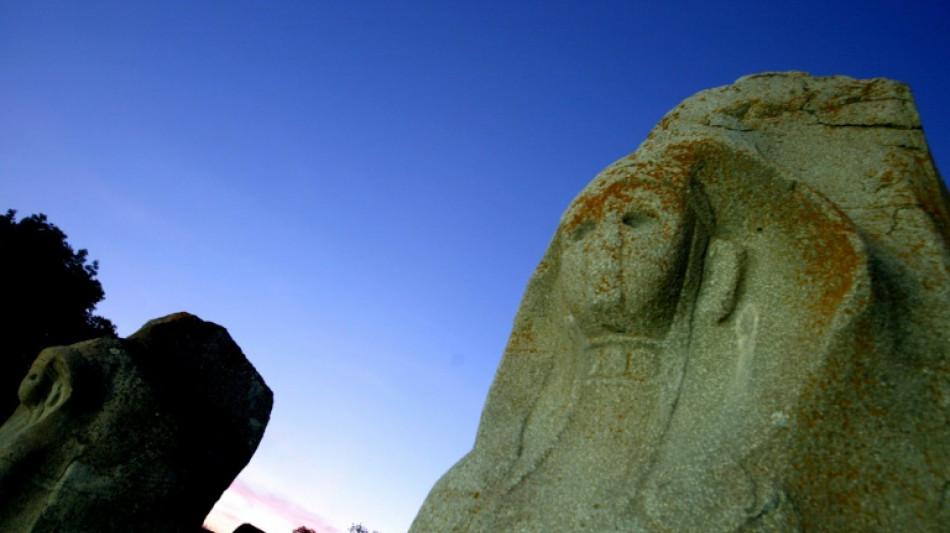
-
 Separatist attacks in Pakistan kill 21, dozens of militants dead
Separatist attacks in Pakistan kill 21, dozens of militants dead
-
'Malfunction' cuts power in Ukraine. Here's what we know

-
 Arbeloa backs five Real Madrid stars he 'always' wants playing
Arbeloa backs five Real Madrid stars he 'always' wants playing
-
Sabalenka 'really upset' at blowing chances in Melbourne final loss

-
 Britain, Japan agree to deepen defence and security cooperation
Britain, Japan agree to deepen defence and security cooperation
-
Rybakina keeps her cool to beat Sabalenka in tense Melbourne final

-
 France tightens infant formula rules after toxin scare
France tightens infant formula rules after toxin scare
-
Blanc wins final women's race before Winter Olympics

-
 Elena Rybakina: Kazakhstan's Moscow-born Melbourne champion
Elena Rybakina: Kazakhstan's Moscow-born Melbourne champion
-
Ice-cool Rybakina beats Sabalenka in tense Australian Open final

-
 Pakistan attacks kill 15, dozens of militants dead: official
Pakistan attacks kill 15, dozens of militants dead: official
-
Ten security officials, 37 militants killed in SW Pakistan attacks: official

-
 Epstein survivors say abusers 'remain hidden' after latest files release
Epstein survivors say abusers 'remain hidden' after latest files release
-
'Full respect' for Djokovic but Nadal tips Alcaraz for Melbourne title

-
 Wollaston goes back-to-back in the Cadel Evans road race
Wollaston goes back-to-back in the Cadel Evans road race
-
Women in ties return as feminism faces pushback

-
 Ship ahoy! Prague's homeless find safe haven on river boat
Ship ahoy! Prague's homeless find safe haven on river boat
-
Britain's Starmer ends China trip aimed at reset despite Trump warning

-
 Carlos Alcaraz: rare tennis talent with shades of Federer
Carlos Alcaraz: rare tennis talent with shades of Federer
-
Novak Djokovic: divisive tennis great on brink of history

-
 History beckons for Djokovic and Alcaraz in Australian Open final
History beckons for Djokovic and Alcaraz in Australian Open final
-
Harrison, Skupski win Australian Open men's doubles title

-
 Epstein offered ex-prince Andrew meeting with Russian woman: files
Epstein offered ex-prince Andrew meeting with Russian woman: files
-
Jokic scores 31 to propel Nuggets over Clippers in injury return

-
 Montreal studio rises from dark basement office to 'Stranger Things'
Montreal studio rises from dark basement office to 'Stranger Things'
-
US government shuts down but quick resolution expected

-
 Mertens and Zhang win Australian Open women's doubles title
Mertens and Zhang win Australian Open women's doubles title
-
Venezuelan interim president announces mass amnesty push

-
 China factory activity loses steam in January
China factory activity loses steam in January
-
Melania Trump's atypical, divisive doc opens in theatres

-
 Bad Bunny set for historic one-two punch at Grammys, Super Bowl
Bad Bunny set for historic one-two punch at Grammys, Super Bowl
-
Five things to watch for on Grammys night Sunday

-
 Venezuelan interim president proposes mass amnesty law
Venezuelan interim president proposes mass amnesty law
-
Rose stretches lead at Torrey Pines as Koepka makes cut

-
 Online foes Trump, Petro set for White House face-to-face
Online foes Trump, Petro set for White House face-to-face
-
Seattle Seahawks deny plans for post-Super Bowl sale

-
 US Senate passes deal expected to shorten shutdown
US Senate passes deal expected to shorten shutdown
-
'Misrepresent reality': AI-altered shooting image surfaces in US Senate

-
 Thousands rally in Minneapolis as immigration anger boils
Thousands rally in Minneapolis as immigration anger boils
-
US judge blocks death penalty for alleged health CEO killer Mangione

-
 Lens win to reclaim top spot in Ligue 1 from PSG
Lens win to reclaim top spot in Ligue 1 from PSG
-
Gold, silver prices tumble as investors soothed by Trump Fed pick

-
 Ko, Woad share lead at LPGA season opener
Ko, Woad share lead at LPGA season opener
-
US Senate votes on funding deal - but shutdown still imminent

-
 US charges prominent journalist after Minneapolis protest coverage
US charges prominent journalist after Minneapolis protest coverage
-
Trump expects Iran to seek deal to avoid US strikes

-
 Guterres warns UN risks 'imminent financial collapse'
Guterres warns UN risks 'imminent financial collapse'
-
NASA delays Moon mission over frigid weather

-
 First competitors settle into Milan's Olympic village
First competitors settle into Milan's Olympic village
-
Fela Kuti: first African to get Grammys Lifetime Achievement Award


Climate change may have toppled Hittite Empire: study
Three years of extreme drought may have brought about the collapse of the mighty Hittite Empire around 1200 BC, researchers have said, linking the plight of the fallen civilisation to the modern world's climate crisis.
The Hittites dominated Anatolia in modern-day Turkey for nearly 500 years, even rivalling the power of the Egyptian Empire for a period.
They were one of several influential ancient civilisations in the Eastern Mediterranean and Near East which were all toppled or severely weakened at around the same time, bringing the curtain down on the Bronze Age.
The Hittites mysteriously abandoned their capital and religious centre Hattusa around 1200 BC, when the royal line died out and written historical documents dried up.
The empire's centuries-old political and cultural structures ended "quite rapidly," Sturt Manning, an archaeologist at Cornell University in the United States and lead author of a new study, told AFP.
There are several theories for what was behind the "Late Bronze Age collapse", including attacks from naval raiders called the "Sea Peoples", epidemics and famines -- as well as a 300-year change to a drier, cooler climate.
But exactly what triggered the demise of these empires has remained unclear.
- 'Existential threat' -
Now, for the Hittites at least, the answer may have come inscribed in the rings of ancient juniper wood.
The juniper comes from one of the world's oldest wooden structures, found at the Phrygian capital of Gordion in central Turkey as part of the excavation of a king's tomb in the 1950s.
By analysing the rings of the juniper wood, the researchers were able to reconstruct climate conditions more than 3,000 years ago.
In semi-arid Central Anatolia, "the major threat to growth for most plants in the region is a lack of water," Manning said.
Narrower tree rings indicate drier years, when a lack of water meant the trees did not grow much.
The rings showed three-straight years -- 1198 BC to 1196 BC -- with "unusually" low growth, suggesting a prolonged and particularly severe drought, according to the study published in the journal Nature on Wednesday.
The researchers suggested that the drought caused severe food shortages, particularly for the land-locked parts of the central Hittite kingdom, which depended on grain and livestock.
The food shortages could have led to political, economic and social unrest, ultimately bringing about the end of the empire.
Manning warned that current global warming means the modern world could face a "multi-year existential threat" similar to the one that affected the Hittites.
Muge Durusu-Tanriover, an archaeologist at Temple University in Philadelphia who was not involved in the study, hailed it as "groundbreaking".
"Now that we know a major climate event might have tipped the Hittite empire beyond its point of no return, there are more questions to ask about climate change, its impact on states and society and, most crucially, what can be learnt from the past during our current climate crisis," she said in a Nature comment piece.
M.Furrer--BTB



